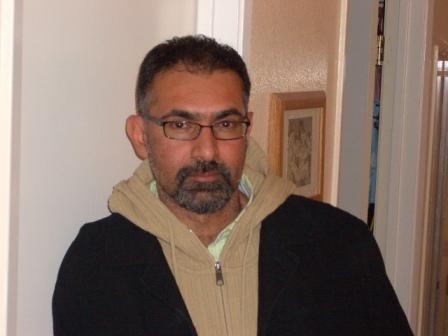An idea for a title came to me while reading Graham Greene's non fictional work by a similar name. Surely, the content would be dissimilar, not even pretentiously Naipaulian or Conradian in its observation. But the essence of the narrative would sum up the title: It is a search for the character of the people and their landscape.
After nearly three decades I will return to the land where it all began: mankind and my literary aspirations. Partly in search of material, partly to quell the pine for homeland, I desire that the journey and its encounters will inspire me; from it I wish narratives will emerge that form the basis of subsequent novels. For Graham Greene two feverish works resulted: The Heart of the Matter and The Burnt out Case.
Yet deep inside me lingers a tinge of ambivalence and apprehension from the enigma of arrival, the fear of rejection, and the sense of a stranger in homeland. Three decades is a long absence; it is a generation. With the knowledge that I have resided outside the country more than I have inside, can I still claim it as my homeland? What is my attachment to it, other than early memories, other than the idea that my forefathers traveled across the black waters of the
I have not entertained any preconceived ideas or expectations; instead, I have elected to travel with an open mind: let the altered landscape and its varied people awash, absorb and assault me with their sense and sensibilities, anger and joy, hope and despair, ambition and lassitude, progress and decrepitude.
What I don't wish to be is an apostate who has relocated and scourges with western sensibilities the escaped landscape and its people. Nor I wish to be sentimental and nostalgic about the loss of an era. Or an apologist. Yet it would be a disservice to narrative form without shedding light to injustice, without exposing hypocrisy, without ignoring unrest, corruption, and avarice of power and without reflecting the societal ills.
To comprehend and narrate peoples' stories, their travails, as citizens who have endured a gradual transformation of the opposing political and economical ideologies over three presidencies of Mwalimu, Mwinyi, Mkapa, and JK, one cannot escape from the underlying ethos and pathos. And in the country's hustling and bustling cities are people--young and old, sick and healthy, black, white, and brown--whose narratives of hope and despair, joy and sorrow, health and sickness, are waiting to be told.
We all have stories to tell: someone has to listen and chronicle them.
Sunday, December 16, 2007
In Search Of Character: An East African Narrative
Nov 4th: Conversation with Nizar Fazal: The Whistle Blower
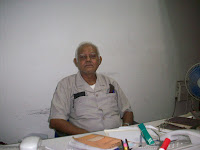
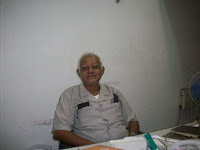
"Voice of Discontent"
Perhaps a hyperbole simile, his essence and presence are felt among the denizens of Dar: he echoes, fearlessly, what local residents shy and fear to tell a tale of discontent.
Nov 3rd: A Day at the schools: Muhimbili Primary and Aga Khan Mzizima Secondary School
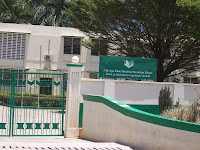
Entrance to the Aga Khan Secondary School
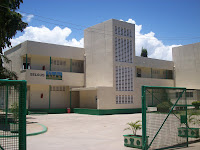 Class rooms where I attended Form I-IV
Class rooms where I attended Form I-IV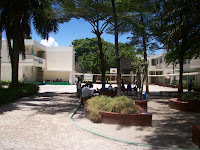 Courtyard where student congregate under the shady trees during recess
Courtyard where student congregate under the shady trees during recess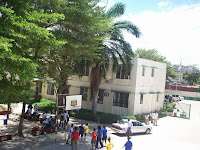 Center courtyard now converted into a basket ball court.
Center courtyard now converted into a basket ball court.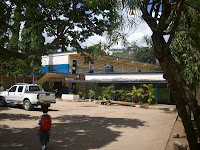
Muhimbili Primary School Entrance
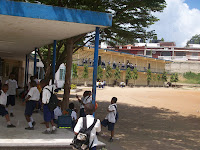
Assembly student area.
Oct 22nd-Oct 26th: Visiting the Island of Zanzibar
Not a travel brochure or a book about
But the island is notoriously known for its Arab slave trade during Omani dynasty; cloves trade, hence the island of spices; and the early visitors—Persians, Portuguese, Indians—and colonizers—Germans and British. Its charm is not in its present lure of vacation getaway for the wealthy. Its enchantment and romance is in its history, its coastal Swahili culture, its taarab music, its fishing villages and iconoclastic dhows, its peoples’ exotic heritages and mannerism, its food and ancient architecture of multi-storied crenellated cement dwellings with large engraved wooden doors and narrow and labyrinth streets that shun the daylight. And lastly, the alluring and enticing women folk, covered in black buibui, who flicker their seducing khol lined-eyes at you.
Time slows down, as it were, in Zanzibar or Unguja as if the narrow streets, the enclosing buildings of Stone Town, the heat, the bright light of the day and lingering humidity from the Indian Ocean, warp it, and induce or cast a magical spell of infectious lethargy. It is an echoed experience among mainlanders—and others—who arrive here by a two hour smooth ferry ride from Dar.
Approaching Unguja from sea, the first sights are of white washed walls of palaces, now museums or tombs, and public buildings with intricate wooden balconies, along the harbor front, where ferries, sailboats, and classic dhows with lateen sails are anchored. Palm trees and coconut groves intersperse grimy old forts, constructed as fortification and slave markets. Men in Kanzus and Kofia and women in bui bui walk about unperturbed by new arrivals pouring into their streets.
Along the harbor front is the Forodhani Area, an open grassy field where at night the place is transformed into a bustling market place, selling curios, artifacts, food and drinks; a meeting place for the locals who languish in the cool air along the ocean front. Kerosene lamps, naked bulbs and tube lights illuminate individual kiosks and food stalls. The air above Forodhani fills with sweet aroma of roasted fatty juices of beef and seafood: crabs, calamari, prawns and fish. At the edge of the grassy area is the Café Zorro, and in the middle an open rotunda, offering its open area as a congregation for youngsters.
Out at sea anchored sailboats and ferries sway in the gentle waters, their dim lights shimmering in the balmy night.
I frequented the area every night and devoured the local delicacies: mishkakis and Zanzibari mix, a dense soup made of Indian Bhajias, yellow coconut curry, and flavored potatoes.
From Forodhani stretch along the ocean front, narrow dirt streets lead and fan into the
Far from the Stone Town paved roads lead to distant parts of the isles where, after the liberalization of the economy in 1992, foreign investments from South Africa and Europe have contrived another Zanzibar—not for its local people, but for westerners and tourists—with luxurious resorts along its pristine coastline to the north and east of the island. It is, indeed, a play ground for the rich.
Yet it is essential for the economy and job creation. Tourism and the hospitality service industry are the largest employers on the isles. Foreign language schools—Italian, French, Spanish, and English—are a cottage industry, and being a tourist guide is what most youngsters aspire. Secondary education, one disgruntled drop out student lamented, is in pathetic state. He said, “Classrooms are full of students, but no teachers, no facilities. I dropped out, and am learning French and Italian so I can become guide during the tourist season.”
During the summer international festival like ZIFF (Zanzibar Internal Film Festival) attracts international attention, induces cash flow and fosters seasonal employment for the locals. But how is the average Zanzibari benefiting from this inflow of cash? All goes into the private investors said one source, and a sliver of it is received by the government in form of taxes, but how much of it goes into the national treasure is questionable. Even if paltry does, it never trickles down into improving the basic facilities for the masses. You will have to ask for accountability and address that with the Minister of Tourism, my source chucked cynically.
Poverty, lack of education, poor health services and insufficient infrastructure issues are no different than the mainland. Just that one does not see them on the surface—they are rampant in the poor areas of the island, and so is the spread of HIV/AIDS., but the presidential administration’s recent national campaign on HIV/AIDS education is a positive sign of social work, both on the mainland as well as on the spice isles (Zanzibar and Pemba).
Like any cultural chasm and apartness, the people of island pride themselves to be different from those of the mainland, not any different in the US between those of the mainland and people of Hawaii. And that cultural disparity and its ethos is well captivated by Paul Theroux in his book Hotel Honolulu, just as well by the Abdulrazak Gurnah, the exiled Zanzibari native, in his novels about the people of Zanzibar. Reading Gurnah gives one a fictional account of its various peoples’ histories during the colonial as well as post colonial era.
For those lyrical or poetically inclined, Taarab music, a combination of African, Arab and Indian influence, is melodious and seductive. Often heard at night during summer at open concerts at the Forodhani or music festivals at the Old Fort, now converted into an open restaurant and semi-amphitheater, the musicians with their ensemble of instruments and entourage of voluptuous women dancing, gyrating and singing can be uplifting and stimulating to all human senses.
As is often the case that the islander views the mainlander with suspicion, so it is between those from Unguja and Bongo, yet they coexist harmoniously as each needs the other, like symbiotic organs.
For a stressed and overworked visitor, Zanzibar offers tranquility and serenity: an exotic equatorial paradise; to a student of human character and history it offers past in its architecture, its poetry, its music and its exotic people—and their ways and habitats, which are intensely and picturesquely captured by a famed photo journalist Javed Jafferji in his book Images of Zanzibar.
Oct 17th: Conversation with Jhaveris
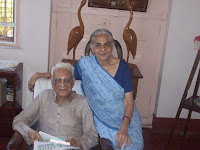
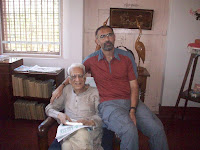
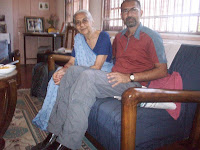
“No,” he retorts, “never an issue. I will tell you.”
Oct 14th: Nyerere Day
Mwalimu’s legacy, eight years after his death and nearly twenty years after his resignation as the president and chairman of Chama Cha Mapinduzi (CCM), lives on among the intelligentsia—and veteran politicians. On this day of remembrance, the current political leadership was challenged by the veteran politicians, academics, and renowned journalists at the “Nyerere Day Debate” held at the
A renowned journalist, Jenerali Ulimwengu, implored that “it is a total misconception to think that peace, national unity and solidarity, came from thin air. These were created by the Mwalimu’s good policies and leadership.”
It is likely that what Mwalimu achieved over the years may disintegrate if current levels of corruption, bad governance and donor dependency are not curbed. Equally critical was Prof. Issa Shivji who said that country lacks a clear “national social vision geared at benefiting all.”
Is this all partisan rhetoric? Whatever, for me it is heartening to read of this open criticism in the press and at symposiums in presence of current high ranking government leadership. We have come a long way to hold and preserve this liberty and the expression of thought, which during early years of Mwalimu, were curbed and censored. It is not uncommon to hear Tanzanians today express their displeasure of current government openly.
“Are guidelines set by the government on editorial content,” I asked The Guardian journalist.
“No. We are at liberty with the content. Nor do we tow the party line, though I think the managing editor does exercise his or her judgment.”
But the deference and awe towards African state leaders displayed earlier, by the older generation, is waning, or not present, among the young generation; they are not tolerant of the rhetoric; they see through it. They want to see the results.
Undoubtedly, JK’s leadership is under close scrutiny, with all the corruption scandals surfacing at the behest of PCCB, an official governing body that adheres to the principles of transparency and accountability. Ironically, reports have surfaced on the net, as well as in the media, that the head of the PCCB has been implicated in charges of graft, which he has vehemently denied.
A well placed official in the government told me if I had a magic wand, the first thing I would want to do is brandish among the pack of wolves in the cabinet and high places that are corrupted to the bone—and cure them of this evil and pernicious malady that has afflicted us. But he told me secretly that he has faith that over time it will wane.
A voice inside me, without justifiable or tangible results, echoes his optimism.
